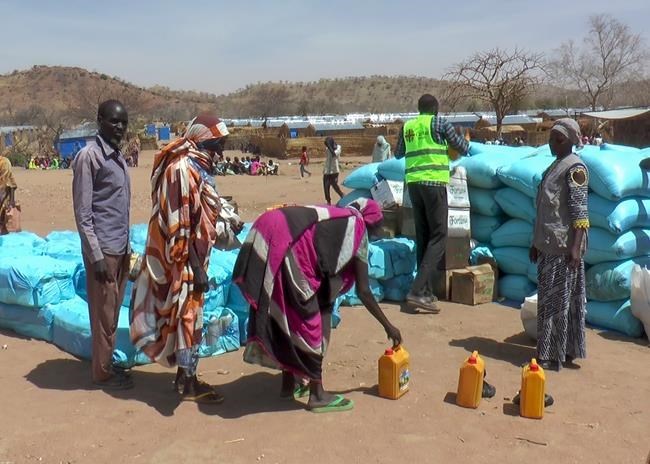OTTAWA — As the federal government belatedly laid sanctions Monday against those it blames for perpetuating a year-long civil war in Sudan, the country's former ambassador in Ottawa said Canada can help lay the pathway for peace.
"The world should be appalled by the unmatched calamity happening in Sudan," said Tarig Abusalih, its most recent ambassador to Canada.
A year ago, a long-standing political feud between branches of Sudan's military broke into armed conflict that caused Western countries to evacuate citizens and resulted in what the United Nations calls the world's largest internal displacement crisis.
The paramilitary group known as the Rapid Support Forces stands accused of trying to replicate the Darfur genocide while the army, the Sudanese Armed Forces, has also been blamed for brazen acts of violence.
Countries such as the United Arab Emirates, Iran and Russia are accused of providing cash and arms for the warring parties, with recent reports that long-distance drones from abroad are being used in the conflict.
The Montreal-based Raoul Wallenberg Centre for Human Rights issued a report Monday that builds the case a genocide is already underway, laying out documentation of massacres, sexual violence and public executions meted out on an ethnic basis.
Canada expressed serious concern about the civil war from the get-go.
Prime Minister Justin Trudeau met with Abusalih the day fighting broke out, when they both happened to be attending a community event near Toronto.
Foreign Affairs Minister Mélanie Joly went to Kenya to meet with regional leaders about ways Africans could help advance peace in Sudan, and Canada allocated humanitarian aid.
It was all part of what Abusalih called a flurry of activity in the first months of the war, as Global Affairs Canada regularly reached out about how Ottawa could support Sudanese people and try to help end the conflict.
Yet until this week, little had happened since last summer.
Joly had not raised the Sudan war in public statements for months when last week, in the lead-up to the one-year anniversary of the conflict, International Development Minister Ahmed Hussen announced more humanitarian funding.
On Monday, Joly announced sanctions on those "directly or indirectly undermining peace, security and stability in Sudan," some seven months after Washington took a similar step.
Those sanctioned include Sudanese paramilitary commander Abdelrahim Hamdan Dagalo as well as former foreign minister Ali Karti, who led an Islamist group that opposes democratic rule. Ottawa is also sanctioning four companies it accuses of emboldening both warring factions.
"This is a small first step from the Canadian government after a year of inaction as Sudan’s civil war erupted, with thousands of people killed, displaced and now on the brink of a man-made famine," NDP foreign affairs critic MP Heather McPherson said in a statement Monday.
Abusalih said Sudan deeply appreciates the $170 million Canada allocated last year for Sudanese within the country and those who have fled to neighbouring states.
Canada has topped up that funding with another $132 million, part of a US$2.1-billion fund for humanitarian relief pledged Monday at a global conference Hussen attended in Paris.
Abusalih said that money is desperately needed by Sudanese people who are facing hunger, a lack of medicines and violence in camps.
"I hope that Paris conference is not just going to be an international public-relations campaign, because in the past we used to have such conferences for Sudan," he said.
"Nothing came out of these conferences, and I hope that all the countries fulfil their pledges soon."
Abusalih resigned from Sudan's foreign service in October, six months into the war, which he said was among the factors that led him to quit.
Since then, Sudan has had just two diplomats in Ottawa, representing a country of 48 million.
Sudanese people respect Canada, said Abusalih, and many recall how the former Canadian International Development Agency helped lead the mechanization of agriculture in the country.
Abusalih said Canada could help create a transition plan for a post-conflict Sudan, in which an interim group of non-partisan experts could manage the country and resolve the humanitarian crisis ahead of democratic elections.
Whatever happens, neither of the duelling groups can take control of the country, he argued.
"We need more efforts from the international community to end the ongoing war in Sudan," he said.
"After the end of this war, we need the United Nations and our friends to call for an international conference for the reconstruction of Sudan."
Meanwhile, Canada has yet to reunite a single family with relatives who are trying to escape the conflict.
Ottawa announced a program last December designed to allow people fleeing Sudan to join relatives in Canada who have the means to provide financial support.
Canadians with relatives in Sudan say the program is too cumbersome and expensive, while the government says it doesn't expect to welcome anyone until nearly a year after the announcement last December.
Abusalih said he hopes Canada can speed up the program and pressure other countries to get both factions to stop fighting.
"There is no winner in this war, and in the end, the loser is the Sudanese people," he said.
This report by The Canadian Press was first published April 15, 2024.
Dylan Robertson, The Canadian Press




